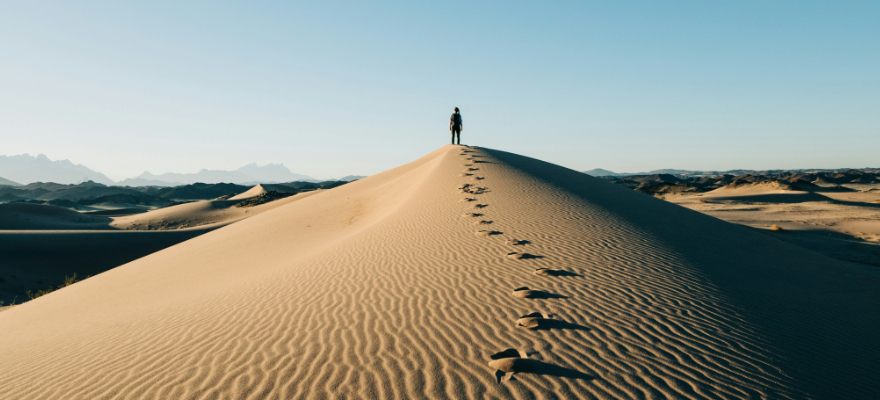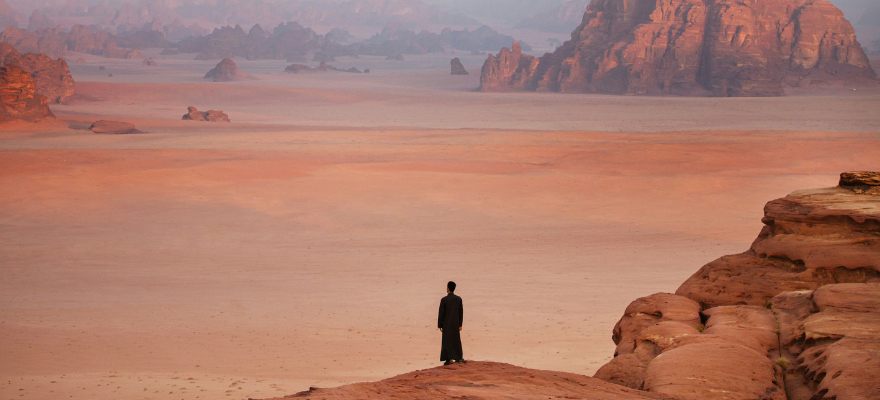
Dryness in Prayer, Part 2 – Crossing Two Deserts
Based on a talk by Rev. Fr. Pachomius Ma. San Juan, OSB
Many of the great mystics and spiritual writers remind us that true growth in prayer frequently takes place in the desolate spaces, the “dry” patches where we seem to lose all sense of God’s presence.
Henri Nouwen describes God’s presence as “His infinitely abundant, overflowing life that reveals itself as loving concern for all,” yet we encounter moments when that overflowing seems to pull back, leaving us feeling parched and alone.
These experiences of emptiness are not detours from the path but integral parts of it. There are, in fact, two deserts we must cross, two distinct yet complementary stages of emptiness that prepare our souls for deeper union with God.
The desert of truth: Facing our poverty
The first desert is the desert of truth, a place where we confront the hard realities of our own hearts. Here we strip away all pretense and come face-to-face with our truest selves. What emerges is not an idealized self but one marked by poverty, misery, and sin. This recognition is painful: no human being delights in admitting their own brokenness. Yet it is precisely in this moment of vulnerability that the seeds of genuine dependence on God are sown.
Only in seeing how small we are do we see the bigness of God. It is only when we see ourselves as sinful, as weak, when we are at our truest self in relation to God, that it reveals to us who God is: forgiving, compassionate, merciful.

By acknowledging our spiritual poverty, we release the burden of self-reliance. We no longer cling to the illusion that we can navigate life or prayer by our own strength. In this humbling encounter, we taste the vastness of God’s mercy. Like a traveler who, having lost everything, discovers the kindness of a guiding hand, so the soul in the desert of truth rediscovers God’s compassion anew.
The desert of silence: Enduring God’s apparent absence
Once we have been humbled by truth, we enter the desert of silence, a deeper emptiness in which not even the consolation of recognizing our sinfulness remains. Here, God feels absent in a way that can seem like rejection. No Scripture passages come to mind; no comforting emotions arise. There is, in fact, no support at all, human or divine.
This second desert is more than just a continuation of the first; it is qualitatively different. Whereas in the desert of truth we might still lean on the truth itself, our own newfound honesty, here we have nothing but stark silence. We may be tempted to flee, to abandon prayer altogether. Yet the invitation is the opposite: Enter the silence. Make God’s silence your silence.

In this profound stillness, God is not indifferent; He is shaping our souls to receive Him in simplicity rather than drama. “God is most eloquent in silence,” Henri Nouwen reminds us.
When the noise of consolation is stripped away, we learn to listen with a more attentive, faithful heart. We learn that faith does not depend on feeling but on a humble trust that God’s promises remain true even when He seems far away.
Prayer as alternation: Consolation and desolation
These two deserts illustrate a larger pattern in the spiritual life: prayer is an alternation between consolations and desolations, presence and absence. Like day and night, our experience fluctuates. God’s distance alternates with His closeness, teaching us not to cling to one season or despair in another.
Expect this alternation to happen in prayer. When consolation comes, we rejoice and gather strength; when desolation arrives, we persevere in faith. Neither season is permanent, nor is either a verdict on our spiritual maturity. Rather, both work together to deepen our reliance on God’s unchanging love.

Perceiving God’s presence in the dark
How, then, can we perceive God’s presence in times of dryness, distance, and darkness? The answer lies in faith. Just as in a dark room we cannot see anything but can still hear a loved one’s voice, so too in spiritual darkness we can trust in the reassuring “voice” of God’s promises. We may not feel His warmth or taste His sweetness, but faith reminds us: He is here.
When you are in a dark room, you see nothing. But when you hear a familiar voice, you know that person is with you.
All we need do is stay in the dark, hand outstretched, ready to be led. Over time, even in the absence of consoling feelings, we begin to sense God’s kindness and love in small promptings and the quiet stirrings of our hearts.

Loving beyond presence: The strength of absence
Our love for God is not qualified by His felt presence. Even without the assurance of consolation, we can continue to love, trust, and offer our hands to be led by Him. Absence does not equal non-existence. In fact, absence can deepen our longing. Absence makes the heart long for the object of love. This long-suffering love is itself a gift and a refinement of our devotion.
God’s ways are always eternally present; He is the same today, yesterday, and forever. Even when He seems hidden, His merciful gaze remains upon us. The deserts of truth and silence, though seeming barren, are the soil in which our faith and love can take deeper root.

Crossing the deserts to union
Ultimately, both deserts serve the same holy purpose: to prepare us for union with God. In the desert of truth, we learn our utter dependence; in the desert of silence, we learn to trust in love beyond feeling. Prayer, then, is not merely an ascent to consolation but a willingness to walk through emptiness with faith. As we embrace both deserts, we discover that the path through emptiness leads us, paradoxically, into the fullness of God’s life.
“God’s presence is His infinitely abundant, overflowing life that reveals itself as loving concern for all.” – Henri Nouwen
May we have the courage to enter both deserts, to make God’s silence our silence, and to discover in our poverty the riches of His mercy. In doing so, we will find that the greatest gift of prayer is not the warmth of consolations but the unwavering presence of a God who calls us beloved, both in the desert and beyond.